
Alan: The Dunning-Kruger Hypothesis posits that stupid people are too stupid to know they're stupid.
Te same intellectual tools that a person needs to undertake dispassionate, thoughtful analysis with perspective, proportion, contextualization, and a sense of "historical/ironic distance" are the same tools people need to acknowledge their own stupidity, ignorance, uninterestedness, passion-for-confirmation-bias as a toxic brew of intellectual shortcomings which prevent them from meaningful self-reflection on their crippling deficiencies.
Mark Twain, Adolf Hitler And The Dunning-Kruger Effect
http://paxonbothhouses.blogspo
McArthur Wheeler: Patron Saint Of American "Conservatism"
McArthur Wheeler: Patron Saint Of American "Conservatism"
| Jim Mattis’s reading list offers a jarring contrast to Trump’s lack of intellectual curiosity | ||||||
 Jim Mattis speaks beside President Trump in October 2018 during a briefing in the Cabinet Room at the White House. He resigned two months later.
Marine General James "Mad Dog" Mattis
Wikipedia
THE BIG IDEA: “If you haven’t read hundreds of books, you are functionally illiterate, and you will be incompetent, because your personal experiences alone aren’t broad enough to sustain you,” Jim Mattis writes in his new memoir, which came out yesterday. “Any commander who claims he is ‘too busy to read’ is going to fill body bags with his troops as he learns the hard way.”
The commander in chief has repeatedly said that he’s too busy to read. “I never have. I’m always busy doing a lot. Now I’m more busy, I guess, than ever before,” President Trump told The Washington Post in 2016.
“Call Sign Chaos: Learning to Lead” is not the kind of tell-all that many of Trump’s critics hoped for. But there are already plenty of those for sale. Nine months after he resigned in protest, Mattis remains unwilling to speak candidly about his 712 days as secretary of defense. Instead, the book is entirely a memoir about four decades as an officer in the Marine Corps – with references to Trump only in the first and final pages. The book is chock full, however, of implicit and illuminating contrasts between Mattis’s management style and Trump’s.
There were no shelves of books in his office at Trump Tower. Meanwhile, Mattis amassed a private collection of more than 7,000 books, despite deployments around the world. “Reading sheds light on the dark path ahead,” he explains. “By traveling into the past, I enhance my grasp of the present.”
In a series of interviews with my colleague Marc Fisher three years ago, Trump was adamant that he does not need to read extensively because he reaches the right decisions “with very little knowledge other than the knowledge I [already] had, plus the words ‘common sense,’ because I have a lot of common sense and I have a lot of business ability.”
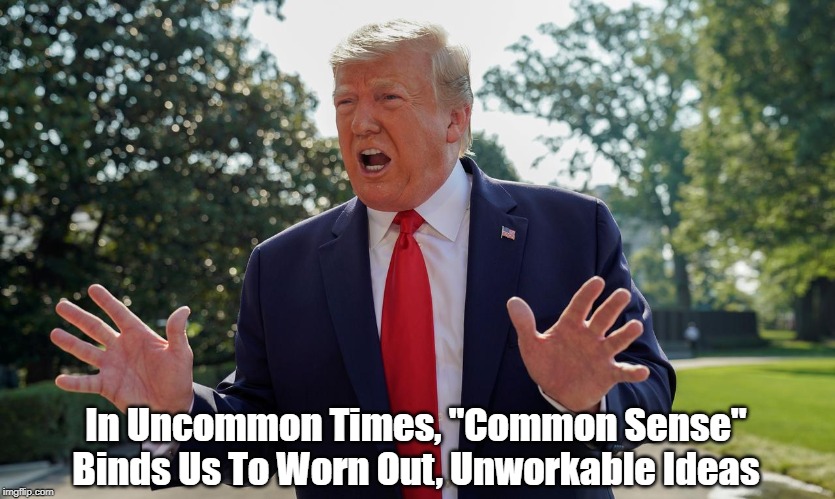
Carl Sagan On Mystery: Why Common Sense Blinds Us To The Universe, And How To Live With The Unknown
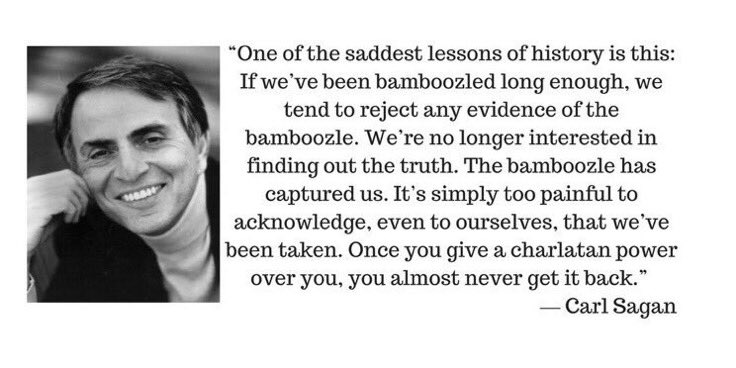
Trump also insisted that he does not need to read anything that’s long because he absorbs complex issues quickly. “I’m a very efficient guy,” he said. “Now, I could also do it verbally, which is fine. I’d always rather have — I want it short. There’s no reason to do hundreds of pages because I know exactly what it is.”
Mattis, who prefers the nickname “Warrior Monk” to “Mad Dog,” repeatedly leans on his bibliomania throughout his 300-page book. The book reads like a literature review at times, as the 68-year-old recommends dozens of titles and name-checks too many authors to mention here. He also makes time to mock the scholars who said after the Cold War that it was “the end of history.”
The way some people prepare for a marathon, Mattis challenges himself intellectually by picking some battle or area of history where he’s weak. Then he fixates on the subject and reads everything he can find until he feels like an expert. “Living in history builds your own shock absorber, because you’ll learn that there are lots of old solutions to new problems,” he explains. “Strategy is hard, unless you’re a dilettante. You must think until your head hurts.”
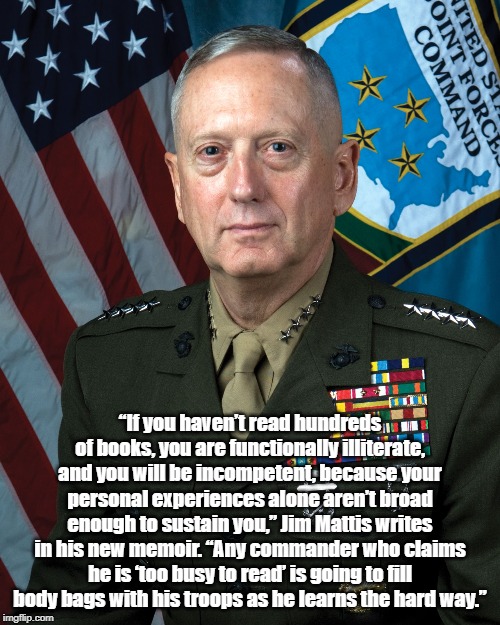
On Fox News in May 2016, Megyn Kelly asked Trump to name the last book he read. “Oh, no, it's so long, because now I read passages,” he replied. “I just don't have the time. … I would love to sit down and read a book, but I just don't have the time anymore.”
The 73-year-old does, however, seem to have lots of time to watch television. And play golf. And tweet.

Mattis is partial to studying Roman generals and historians, from Marcus Aurelius and Scipio Africanus to Tacitus. “I followed Caesar across Gaul,” he writes wistfully. “I marveled at how the plain prose of [Ulysses] Grant and [William Tecumseh] Sherman revealed the value of steely determination. … Biographies of … Native American leaders, of wartime political leaders and sergeants, and of strategic thinkers from Sun Tzu to Colin Gray have guided me through tough challenges.”
Mattis argues that intellectual rigor is just as important as physical rigor to excel in his beloved corps. He remembers a grueling jog from decades ago on a sweltering day with an Israel exchange officer in the Virginia woods, probably at Quantico. “Read the ancient Greeks and how they turned out their warriors,” the Israeli bellowed. So he did.
 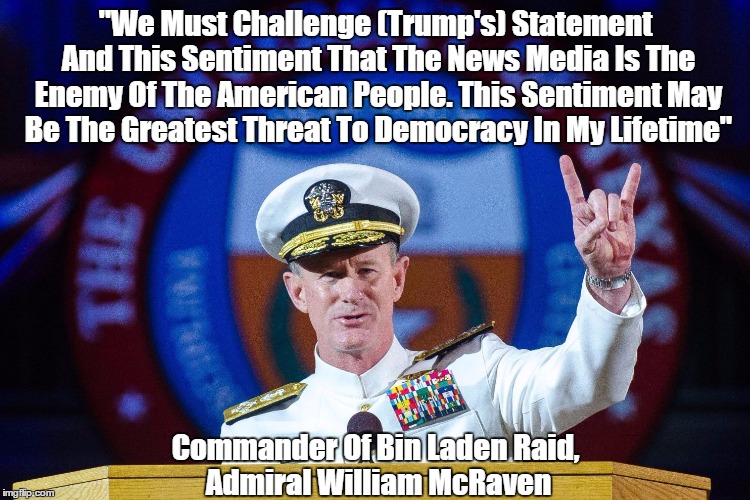
The president’s disinterest in reading books is historically unusual. Barack Obama still occasionally shares reading lists on his Facebook page. During his second term, George W. Bush competed with Karl Rove to see who could polish off the most books each year. As president, Trump regularly plugs hagiographies about himself on Twitter, but there’s no indication he’s read them.
Trump’s dearth of historical knowledge has almost certainly played a role in the biggest miscalculations of his administration, especially the fateful decision to launch a trade war against China that he promised the American people would be quick and easy to win. Lack of elementary knowledge about Asian history also contributed to his naive approach toward Kim Jong Un and North Korea.
 
Formulating plans for invading Afghanistan in 2001, Mattis read about the British experience in Burma. He was especially interested in the Chindits, a long-range penetration force led by Brigadier General Orde Wingate in 1943 that successfully projected forces behind enemy lines.

The Marine Corps maintains a list of required reading for every rank. Mattis, who was assisted in writing the book by Marine veteran Bing West, said this common core curriculum proved critical as he rose in the ranks because he could comfortably cite specific examples of how fighting forces had faced similar challenges in previous eras, knowing that his troops would understand what he was referencing. “This provided my lads with a mental model as we adapted to our specific mission,” he explains. “Slowly but surely, we learned there was nothing new under the sun: properly informed, we weren’t victims – we could always create options.”

“Sitting on sand dunes, I pulled out books I carried in my rucksack that revealed how others had handled desert warfare,” he adds. “Using a technique I had found in my reading, I intended to gather information that bypassed normal reporting channels by means of ‘focused telescopes.’ I copied this from Frederick the Great, Wellington, and Rommel, among others.”

Erwin Rommel, a Nazi general, isn’t the only American adversary Mattis learned from. In 1991, Mattis’s battalion captured an Iraqi major who spoke English and tutored him on the way that army used “skip-echelon techniques” to cut down on staff size. In Afghanistan, a decade later, Mattis emulated this so that he could keep his staff as small as possible. He pared down a brigade that could have had a staff of over 200 to only 32, something he’s immensely proud of.
In late spring 2002, Mattis was promoted to a two-star general. He took command of the 1st Marine Division and was ordered to prepare to go to war in Iraq. Mattis writes that the idea of invading Iraq “stunned” him. “Even assuming he had chemical weapons, I believed we had him boxed in with our daily combat air patrols and sanctions against his oil exports,” he volunteers. “Having served 20 years in the region, I knew that [Saddam Hussein’s] hatred of Iran worked to our strategic advantage.”
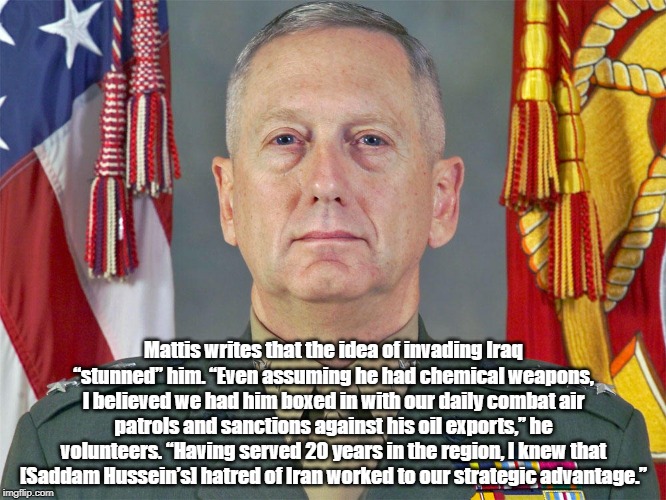
Compendium Of Best Pax Posts On The Iraq War
But Mattis said his commanding officer told him that his job was to get 22,000 troops ready for combat, regardless of whether he thought it was a good idea. That night, he remembers, “I dumped my gear in my quarters, pulled books off the shelves, and began studying campaigns in Mesopotamia, starting with Xenophon’s ‘Anabasis’ and books on Alexander the Great – working my way forward.”

Mattis speaks to Marines at a rifle range at Guantanamo Bay, Cuba, in December 2017. (Robert Burns/AP)
His division deployed to Kuwait. As they waited around for the president to issue the go order, Mattis ate MREs and devoured books to prepare mentally for war. “Marcus Aurelius’s ‘Meditations’ was my constant companion. His advice kept me dispassionate in some of the most infuriating planning conferences,” Mattis remembers. “‘The Siege,’ by Russell Braddon, described a British defeat in Iraq in World War I on the same ground I’d be fighting through. Of course, T.E. Lawrence’s classic ‘Seven Pillars of Wisdom’: few Westerners in recent history had achieved his level of trust with Arabs on the battlefield.”
Mattis studied Sherman’s March to the Sea at the end of the Civil War, looking for insight on how “to always keep enemies on the horns of a dilemma, left or right, front or back.” He also read a biography of Gertrude Bell, who helped create modern Iraq. “I’m an opportunistic learner,” he explains. “I may not have come up with many new ideas, but I’ve adopted or integrated a lot from others.”
After the invasion, Mattis’s headquarters wound up being only 500 meters from where Alexander the Great laid in state in Babylon. He laments in the book that much of the trouble that followed in the occupation would have been foreseeable, and even avoidable, if political decisionmakers had studied the British occupation of Iraq after World War I and the French battle for Algiers in 1956 the way that he had.

Later in the book, Mattis criticizes Obama and Joe Biden for being soft on Iran and too eager to get out of Iraq. Mattis was pushed out as the head of Central Command by the Obama administration because of his hawkishness toward Tehran, though he didn’t want Trump to pull out of the nuclear agreement.
Another theme that has long preoccupied Mattis is battlefield communication in the fog of war. Viscount Slim, a British field commander in Southeast Asia during World War II, wrote in his memoir “Defeat into Victory” about various methods he used to direct units that were faraway and in deep jungles, out of radio contact for days or weeks. One approach was to explain his broader intentions to junior officers so that they would understand the strategy when they needed to make decisions outside the chain of command. Mattis took this to heart.
He also enjoys fiction. Sitting in combat zones, Mattis recalled scenes from “The Killer Angels,” Michael Shaara’s historic novel about Gettysburg, and Dante’s “Inferno.”
The general even recommended to his Marines that they read poetry. “Other men’s flowers,” an anthology by Lord Wavell, is one of his personal favorites. Trump does not read poetry.
The love of reading dates to his childhood. Mattis said he grew up in Richland, Wash., with a well-stocked home library, “instead of a television.” As a boy, he remembers devouring young adult titles like “Treasure Island,” “Captains Courageous,” “The Last of the Mohicans,” “Call of the Wild” and “Swiss Family Robinson.” Ernest Hemingway was his favorite childhood author, followed closely by William Faulkner and F. Scott Fitzgerald. He read everything he could about Lewis and Clark because their expedition had passed through his hometown on the Columbia River a century and a half before.
Mattis was commissioned as a second lieutenant in early 1972 during the doldrums of Vietnam when the draft meant that many Marines didn’t want to be there. Deployed with a carrier group in the North Arabian Sea as a young grunt, Mattis filled his free time by reading everything from “Starship Troopers” to “The Battle of Okinawa.”
In contrast, the president prefers visuals over written text when it comes to briefings on the hard issues that reach the Resolute Desk. The New York Times reported in 2017 that National Security Council staffers were told to keep briefing papers for Trump to a single page, with bullet points and graphics. Reuters reported that the president’s daily briefers strategically placed Trump’s name in as many paragraphs as possible in a gambit to hold his attention. The Atlantic has called Trump “America’s first post-text president.”
“I like bullets, or I like as little as possible,” Trump told Axios in 2017. “I don't need, you know, 200-page reports on something that can be handled on a page.”
Mattis makes clear in his book that Afghanistan cannot be handled on a page. Nor can Iraq. Or NATO. He decries the deceptive simplicity of PowerPoint, which he calls “the scourge of critical thinking.”
“It encourages fragmented logic by the briefer and passivity in the listener,” Mattis writes, adding that “it makes us stupid.”
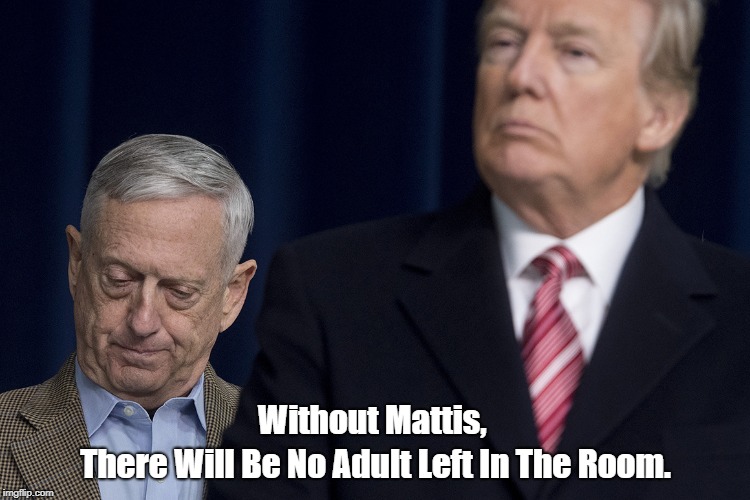
Alan: And here is what educated people encounter as Trumpista cultists continue to fray the fabric of civilization.
Arguably worse is that they simply have no clue what they're doing.

Tyranny's Best-Kept Secret: It's All About Epistemology
Trump, Obama, Intellectual Rigor And Teasing Out Truth: What Golf Tells UsTrump Could Begin Every Speech With The Words "Everything I'm About To Tell You Is A Lie" And...John Kennedy Jr. Is Alive... And He's Trump's Biggest Fan! QAnon: The Evanescence Of Sanity, And The Catastrophic Collapse Of American "Conservatism"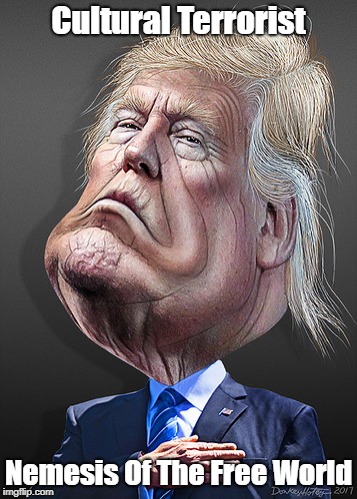
Mark Twain, Adolf Hitler And The Dunning-Kruger Effect
New York Times Interviews David Dunning, Co-Author Of The Dunning-Kruger Effect
McArthur Wheeler: Patron Saint Of American "Conservatism"
Stupidity For Dummies: The Study Of Ignorance Helps Understand How Intelligence Works
http://paxonbothhouses.blogspo |


No comments:
Post a Comment